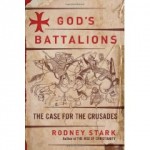 If you’ve ever wondered what the Crusades were all about this is the book.
If you’ve ever wondered what the Crusades were all about this is the book.
I’ve read many books on the Crusades, including those by the major players like Sir Steven Runciman and Jonathan Riley-Smith, but if I were to recommend one book on the Crusades it would be this one by Rodney Stark.
In God’s Battalions Stark debunks the inaccurate characterizations of the Crusades propagated by biased Enlightenment historians like Gibbon and Voltaire, as well as modern secular historians turned Muslim-apologists. Stark does so, as any good historian should, through the application of logic to fact. The book is also amply footnoted and sourced.
Stark demonstrates the Crusades were a just and necessary response to militant Islamic aggression and Islamic persecution of Christians in the Levant. He is also convincing in his argument that the cultural achievements of Islam have been exaggerated and in any event were largely attributable to the Christians and Persians who were conquered and subjugated in Muslim society.
Perhaps most importantly, Stark answers the one question that has not been adequately or persuasively answered in other books I’ve read on the Crusades: What caused these leaders of European society to sell or mortgage everything they had and march 3,000 miles to risk their lives in battle in a foreign land that seemingly had little or nothing to do with them? I believe Stark has the answer, and it is one Christians in particular should find refreshing.
This book is considerably more readable than most books you will find on the Crusades and is an excellent overview of the history leading up to the first Crusade through the end of the Crusades in the Levant in the early fourteenth century. Stark gives just enough background on the leading characters of the Crusades to make them memorable without interrupting his narrative of the Crusades.
This is a must read for anyone venturing into the history of the Crusades for the first time, as well as anyone who needs a good mooring in the truth before delving into more detailed studies of this fascinating period of history. I highly recommend it. GS

